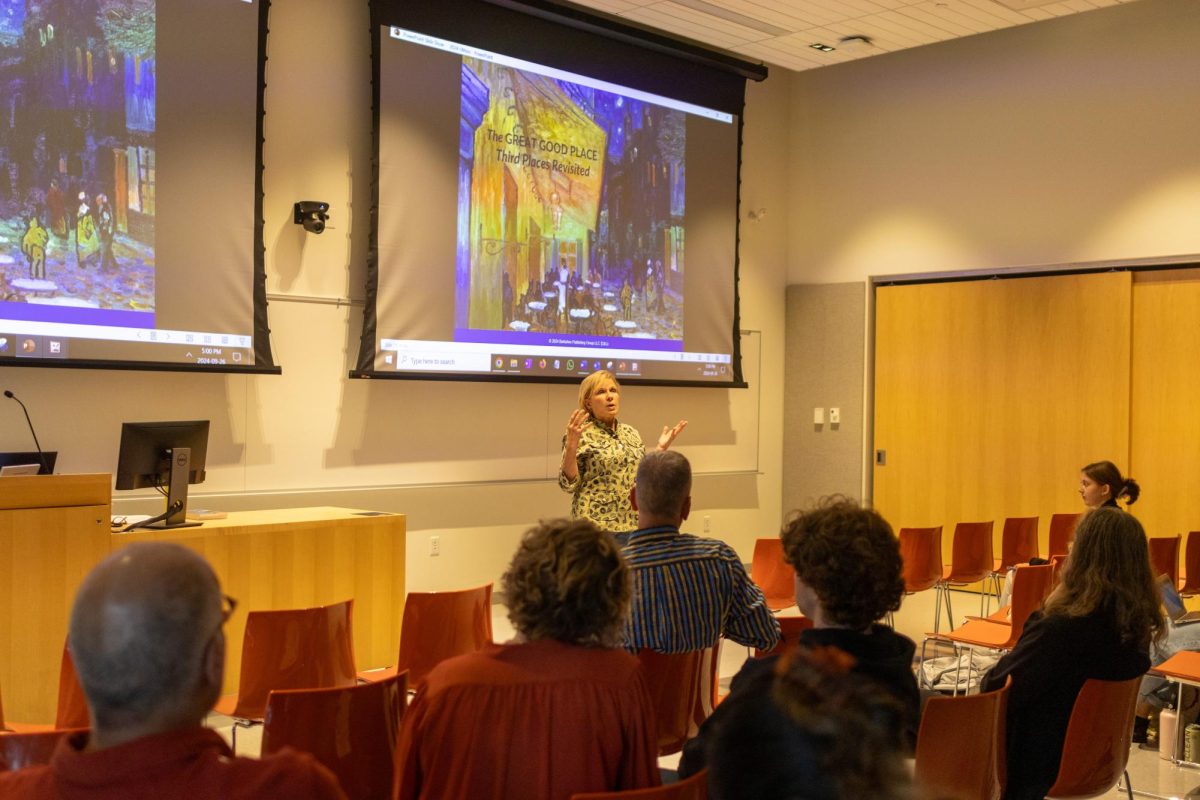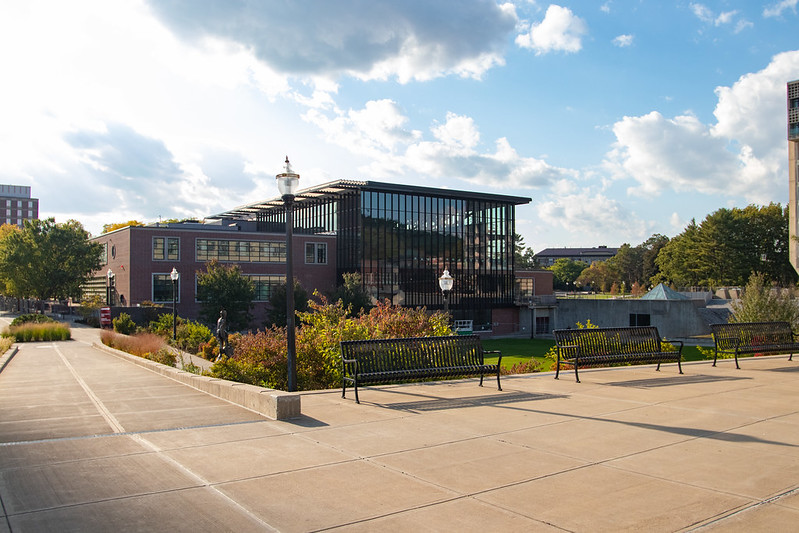On July 1, 2013, the University of Massachusetts went completely tobacco-free, officially banning traditional and e-cigarettes, hookahs and chew.

Tobacco-free policies are supported by the Center for Disease Control, the World Health Organization, the American Academy of Pediatrics and the American College Health Association. The University hopes that the initiative will improve health standards for students and employees alike.
The town of Amherst has already implemented a ban on the sale of cigarettes from “any stores with health care institutions inside them,” according to the Daily Hampshire Gazette. The regulations affect chains like CVS that offer in-house pharmacies.
UMass students and faculty worked together on a health council to debate and write the new campus-wide rules. One of the foremost supporters of a tobacco-free campus is associate professor of microbiology Wilmore Webley.
In August, Webley addressed the University’s residential life faculty about the plan. He opened his presentation by drawing the link between tobacco and lung cancer, the No. 1 deadliest cancer in the United States, according to the Centers of Disease Control and Prevention.
“One in five deaths in the United States is related to tobacco,” Webley said, speaking to resident assistants and peer mentors. “If anything else was killing 20 percent of our population, we’d be outraged.”
Added Webley: “What use is it if you get a fantastic education from a top [Research I] university, but you can’t do what you set out to do because of the effects of smoke or secondhand smoke?”
The tobacco-free policy comes in the wake of landmark reports from the Surgeon General in both 2006 and 2010 placing emphasis on the idea that “no risk-free level of exposure to secondhand smoke” had been found. Secondhand smoke, also called “passive smoke,” is the unfiltered, carcinogenic byproduct of burning tobacco.
“So how can you protect everyone who doesn’t want to smoke?” Webley said. “This policy is an answer to that question.”
Webley assured students that the intention of the ban isn’t to hurt tobacco users.
“While we do have a tobacco-free policy, we have to be sensitive,” Webley said. “We value those students and the diversity they bring to campus.”
Instead, Webley said that the policy is meant to protect students, faculty and workers from unwanted risk.
“If all that [tobacco] did was kill the people who used it, we couldn’t ban it – people have control over their bodies,” Webley said. “But 50,000 people die every year in this country without ever putting a cigarette to their mouths.”
One of the biggest concerns students have raised about going tobacco-free is the lack of penalties for non-compliance. As of now, no fines or security teams have been put in place.
“A lot of people [on the council] focused on enforcement, enforcement, enforcement,” Webley recalled. “But I’m concerned with education.”
He believes that the policy now reflects that sentiment.
UMass is now one of more than 1,000 different schools across the country to adopt a tobacco-free campus. While a few schools have hired security officers to levy fines from offenders, Webley said that the majority of those campuses have been successful without taking that extra step.
He stated that “having a tobacco-free campus is a change in social norms,” and that the change would require “a community effort.”
As with any policy violation, there will be disciplinary action for repeatedly ignoring school rules. Nevertheless, Webley hopes the policy will “engender conversation, not confrontation.”
In a letter to The Massachusetts Daily Collegian in 2011, student Nathan Lamb stated that “students should fume over [the] smoking ban.” He went further to decry the ban on smokeless tobacco products like electronic cigarettes, which contain no tobacco at all.
In his presentation, Webley addressed these qualms. He said that electronic cigarettes, which contain equal if not increased amounts of nicotine over traditional cigarettes, carry with them the risk of congestive heart failure, seizures and loss of vision.
And though e-cigarettes are smokeless, John Kelly of the Washington Post recently warned that the secondhand vapor produced by the devices is understudied.
Citing research from the Fraunhofer Institute in Germany, Kelly said that both nicotine and propylene glycol had already been found in secondhand vapor. Propylene glycol is an organic compound that has been linked to allergic development in children.
Users of the banned products are now being asked to leave the UMass campus if they need to use tobacco but they are not being required to quit.
“The policy doesn’t say you can’t smoke – it just says you can’t smoke here,” Webley said.
Nevertheless, there are facilities in place to help smokers with voluntary tobacco cessation. University Health Services is now equipped with nicotine replacements, including patches and gum, as well as free one-on-one counseling. The school is also offering vouchers to help alleviate the cost of nicotine replacement therapies for addicted students.
Despite the risks to non-smokers, some students have continued to protest a tobacco-free campus.
In response, Webley said, “You’re always going to find a faction of people who oppose this. But does that mean the rest of us should continue dying?”
Soren Hough can be reached at [email protected].
Editor’s note: In the original version of this story, The Collegian misreported that Wilmore Webley is an assistant professor of microbiology. Webley is an associate professor of microbiology. The Collegian regrets this error.



















Zac Bears • Sep 26, 2013 at 12:57 pm
“Maybe this will force the type of people who smoke from attending Umass and create a better school.”
***
This is the most foolish comment. I don’t know if you all remember, but Barack Obama smoked cigarettes until 2010. His presence here during undergrad definitely would have made the school “worse.” Generalizing that smokers are bad people is just stupidity. Smoking is an act of consumption, perhaps irresponsible consumption, but consumption. If you get 1 fast food meal a week, you are just as bad as a smoker. If you drive a car, you create pollution and put people in danger because of the statistics of driving.
***
Stigmatizing an action just because you do not partake in it and feel that you have the moral authority to judge others and divine punishments is wrong. It’s undemocratic and does not deserve an ounce of consideration at a public university, but, alas, our University isn’t as public as it used to be.
concerned alum • Sep 25, 2013 at 11:30 pm
Kim would have fully supported this measure. May the games begin! Please; take away the student’s freedoms and control their minds.
’tis the point of college, yes?
dude • Sep 17, 2013 at 6:35 pm
you guys should’ve went to school in CO.
Anon • Sep 10, 2013 at 5:12 am
In response, Webley said, “You’re always going to find a faction of people who oppose this. But does that mean the rest of us should continue dying?”
Hahahaha. This guy is a tool. Talk about a text-book case of logical fallacies (i.e., slippery slope, appeal to emotion, false cause, black-or-white, etc). Obesity is now the leading cause of death in America- how about we ban all junk food, or else everyone will continue to die?
Anon • Sep 10, 2013 at 5:06 am
Lol, silly UMass trying to improve its image through pointless means. Let’s ban greek-life, because statistically speaking the majority of sexual assault on campus happens in frats/sororities. And let’s ban alcohol, because alcohol is technically a toxin. And let’s ban sex, because that can lead to STD transmission. You know what, let’s just ban parties.
Mike, what? “Maybe this will force the type of people who smoke from attending UMass and create a better school.” Seriously tho, what??? I’m hoping this was a joke comment, and if it wasn’t, I’m hoping you’re not a college student.
mason • Sep 10, 2013 at 12:58 am
I think the underlying basis is partly one which is socially influenced(the general anti-smoking culture and the smoking ban is one of many which has spread from restaurants and bars to public government buildings to universities(there is a non-profit group that advocates smoking bans)); there perhaps could be financial incentives provided to the school which we do not know about(this may be evidenced by free smoking products which are quite expensive offered by the school) and to a smaller extent health health insurance cost.
Given the age of it’s students and the length of time they’re enrolled; the school will at best save minimally from discouraging them from smoking(asthma flare-ups) however it could substantially if employees start to quit.
I don’t know why people get so emotional about these issues; if to you being able to smoke is freedom than that indicates how little freedom you have and how meager allotted privileges of freedom you tolerate are(as if you were insistent of freedom you first would not seek it and secondly it would extend beyond being able to stand in a spot for 5 minutes and inhale and exhale smoke) and secondly the smoking ban is on a micro scale but as a part of a sum; a step of a series of cumulative steps benefits for the health of our country and our people.
The fact that smoking is even legal is absurd and equally absurd is that there is a product people willingly consume knowing it will kill them.
Anony • Sep 9, 2013 at 10:52 pm
Proving that English is not a bad major after all. Thank you for your help!
alum • Sep 6, 2013 at 4:35 pm
Hey JC,
What are you, an English major?
Mike • Sep 6, 2013 at 9:21 am
Finally the admin gets something right. I hope this ban is heavily enforced. Maybe this will force the type of people who smoke from attending Umass and create a better school.
Soren Hough • Sep 5, 2013 at 9:48 pm
Thanks for reading! For those of you curious about the current state of e-cigarettes:
“The survey also found that 76.3 percent of students who used e-cigarettes in a 30-day period also smoked conventional cigarettes at the same time.
E-cigarettes have been promoted as an aid to stop smoking but both the CDC and FDA warn that there is no conclusive evidence the product aids in quitting smoking.”
http://www.reuters.com/article/2013/09/05/us-usa-health-e-cigarettes-idUSBRE9840X820130905
JB23 • Sep 5, 2013 at 8:53 am
It’s just elitist bs to make the school look better. People thinking they know what’s best for everyone else. Hey we’re all gonna die anyways right? If getting a little smoke in your nose is that much of an inconvenience in your life, then odds are you have a pretty easy life and should let us miserable stressed out smokers enjoy our vice. What’s their reasoning for banning dip?
JC • Sep 5, 2013 at 2:06 am
The big thing I like about it is that some people on campus have severe athsma that cigarette smoke can trigger an attack with yet people smoke right outside doors of buildings. It’s really unhealthy for them
anonymous • Sep 4, 2013 at 11:00 pm
How about when a superviser smokes pot on campus.
Anon • Sep 4, 2013 at 9:27 pm
I’m a student here, though I am not a smoker.
What really upsets me is that smoking, even though I don’t do it, is a freedom. I get the whole, “don’t smoke indoors” ideal: being stuck in a room with smoke that’s harmful to you is both unfair and not okay.
However,
When you go outside, you have a choice. I can think of very, VERY few instances when I HAD to walk by someone smoking. Though the smoke is an irritant to me, it never has ever bothered me when I’m outside. Yes, the smell is unpleasant. But should we ban all cars on campus too? They produce more harmful smog than all the smokers on campus combined. It’s also not healthy to breathe in exhaust fumes, but we still live with cars being around us.
Until every single car on campus is electric, and every single watt of power made by power-plants used to power the campus is made via renewable energy, this ban is flat out unfair, and a violation of freedoms. You are not going to get cancer from spending 5 seconds a day being around someone who smokes.
Let us not forget that the school serves french fries and hamburgers at our DC’s. Those, eaten every day, will cause harmful effects, but are still allowed. Now, I get it, eating a hamburger won’t give someone else cancer the way that smoking could. But it does seem rather unfair that the school gets to cherry-pick which aspects of health it thinks it should allow us agency about. Meanwhile, you and I pay these people some multi-thousand dollars a semester to go here. So, you can’t kill yourself by smoking, that might make other people uncomfortable, but by all means eat crappy food all day and walk by cars.
Yet, students aren’t the ones who’ll suffer because of this. The people who will be most affected are the workers at the DC’s, and they, of all the people at UMass in my opinion, deserve at least the freedom to get 10 minutes every few hours to relax after cleaning off dirty plates used by us.
It doesn’t matter though. This campus has made it explicitly clear how we’re all just numbers and digits. If you think I’m lying, call the financial aid office next time you have a problem. Have fun being automatically hung up because there are four other people in front of you.
What gets me about this though, more than anything else, is that it’s a flat out abuse of power. An abuse of power by people who live comfy cozy lives and get payed nice wages that are payed for by the people they themselves are manipulating. Being a student truly is like paying rent to work, but now, here at UMass, you pay to work and are socially manipulated to do it in the way that makes the people you pay happy.
This ban may have been made with good intentions, but underneath the cute buzzwords that UMass now gets to plaster all over the school, it’s another political stunt to make UMass look better, not to make the students here live healthier lives. If that was what they wanted, the policy change wouldn’t have sucker-punched the small population of smokers, but all the students. They know they can’t get away with it, and so they did this instead.
Adam • Sep 4, 2013 at 3:54 pm
Just want to point out that if your only exposure to cigarette smoke in your life would have been second-hand on a college campus, your risk is probably pretty negligible. Note that the CDC says quitting before the age of 40 reduces your risk of dying of a smoking-related illness by 90%. I’m guessing the 50,000 people who die from secondhand smoke related issues every year are people who spend a lot of time with smokers in enclosed spaces (spouses, children, friends).
Let’s be reasonable, folks. I like the idea of educating people on the dangers of smoking, after all, that’s what has cut smoking rates in half since the 60s – not toothless bans.